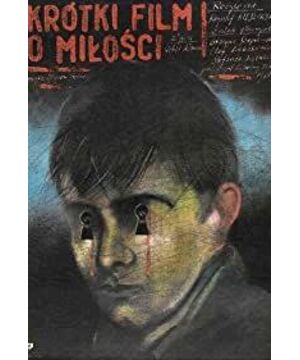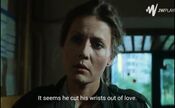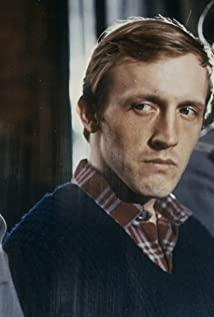"Love Short Film" is a film directed by Krzysztof Kieslowski that explores the relationship between the voyeurism of the forbidden area of human psychology and the eternally admired theme of love. It uses voyeurism as a narrative impetus, and tells the story of a 19-year-old childish postman who peeks through a telescope at the woman in the opposite apartment and develops a crush on her. But when the woman learned the truth and seduced him, the young man felt humiliated and chose to cut his wrists to commit suicide, thus disappearing from the woman's life, but aroused the woman's goodwill towards him and the expectation of his return. In the end, the woman reunites with the teenager and falls into a deep love fantasy. Through psychoanalysis, we can fit the text and find out the role of voyeurism in the promotion of plot and characterization.
1. Peeps That Drive Narratives
The young Tomek is a loner. His parents are deceased. He lives in a cowardice and lacks communication with the outside world. He lives under the protective shell of a dark room. With the help of high-powered telescopes, he escapes from the physical space of reality and the rules of interpersonal communication. The subject's imaginary contact and intimacy. The objective physical separation between buildings, the partial occlusion of the viewing range by window frames and curtains, the start and end of the viewing process caused by the light switch, and his own choice of viewing objects and events (unwilling to see Magda and other men) Ambiguous), which caused the distance in his visual acceptance, so that the woman Magda formed a fetish image in her heart that could be viewed from a distance but not to be played with. Her selective viewing includes lively and playful life scenes such as Magda playing with a hanging hammer, squeezing butter on bread, and gesturing in front of oil paintings with a silk scarf, as well as knocking down a milk bottle and holding her forehead with both hands when she is disappointed. The sympathetic and sympathetic gestures such as the milk spilled on the side of the fingers and the sliding of the fingers have become the appearance and mirror of his Platonic love. In real life, he also tried to approach Magda with some discreet actions, such as slightly offending her by making harassing phone calls, forging remittance notices to prompt her to come to the post office to talk to him, and acting as a milkman incapable of being a milkman. A glimpse of her sleepy face at the moment of opening the door, etc., to complete the childish imaginative emotional communication. But when a sudden threatening force—when other men appeared, broke his framed picture of a better life and presupposed pure femininity, and had intimate physical contact with women, prompting him to develop jealousy and revenge— Calling the gas company and lying about a gas leak in Magda's apartment, which made the repairman stop their love of fish and water, thus completing his passiveness and falsehood of voyeurism in the dark, his initiative to directly intervene in each other's life with a tough attitude , the leap of authenticity. Therefore, the continuous intensification of his actions made Magda feel overwhelmed by these pranks, and finally his emotions exploded after the second "remittance order scandal", and at the same time inspired him to feel guilt, which became a formal statement to Magda. An opportunity to step into each other's real life.
Magda's learning of the truth is the film's first turning point, the moment when Tomek, who has become a voyeur, is spied on, violated, and revengeful. Realizing the presence of the peepers, she leaned over the window, causing Tomek to recoil like a punch, shattering his imagined world of two from within. And then there is a medium shot of Magda's back as she looks out, a shot that approximates her point of view, suggesting a tendency to shift dominance. She defiantly pushes Tomek to voyeurism by showing Tomek the key in the clock (the phallic signifier), dragging the bed to the window, exposing her body and showing off sex with other men The status of the morally depraved ilk forced him to give up the props/spyglasses of indecent behavior and the closed crime scene/room of shame, and walked out of the apartment building to be beaten and punished by the angry man. It is not difficult to see that the voyeur's pleasure is based on the safety of voyeurism, that is, the voyeur does not find the existence of "that pair of eyes". Once this security is broken, the voyeur will fall into moral torture. , the pleasure disappears and the guilt begins. At the same time, Tomek resolutely went downstairs without fear of the man's reprimand, which is also his affirmation of his voyeuristic behavior out of spiritual love rather than physical desire, which is similar to the plot he chose to tell Magda the truth before. the same mental activity. However, his idea was shattered by Magda's actions later. When Magda learned that Tomek wouldn't fight, it was a "ridiculous and cute" situation that she peeped out of pure love, she was no longer angry, and even withheld letters to block her contact with other men. All the shameless behaviors are completely forgiven; instead, he has an interest in and a desire to seduce Tomek, and after inviting him to his home, he exposes his inner sensuality. She was shattered, and she couldn't resist her carnal desires. Her already guilt-ridden heart was humiliated by the fact that she was about to become a sexually incompetent person, and her masculinity was used, played, and even crushed by the other party. This directly contributed to Tomek's suicide, which became the second turning point in the story.
2. Peeping and Anti-peeping
After Tomek was sent away for medical treatment and pulled out of Magda's life, she had infinite worries, nostalgia and hope. But since no one knew or even cared about Tomek's whereabouts and the old woman's obstruction, she lost all contact with Tomek. So she grabbed a pair of small binoculars and looked out the window of Tomek's sojourn. This makes the original duality of voyeur/peeped-on person complete the reversal of identities, as well as the reversal of video and narrative viewpoints. At the same time, this also shows that Magda has a strong yearning and love for Tomek, which is in natural contrast with her previous attitude of disbelief in love, which she thought had nothing to do with love. At the end of the film, Magda came to Tomek's room and saw Tomek, who was sleeping with a bandage on his wrist, and saw through his telescope the illusion of love between himself and Tomek. The image of peeping is thematically equated with love.
In addition, there are two peeps in the film. One is Masin's mother, Tomek's temporary guardian. As the main participant in Tomek's sojourn life, she is concerned about Tomek's emotional life and psychological activities, but the two have never been able to establish a bridge of communication in their minds, and even become the bridge between Magda and Tomek. hindrance. She regards Tomek as a substitute for her son Mahin, pouring out the inner loneliness of the empty nester, with Tomek's cold working environment and inhumane colleagues, Magda's previous chaotic concept of love and countless passer-by-like feelings The men together form the background of the film's story - an indifferent society. In this human emotional predicament, her desire for communication turned into some kind of control over Tomek, such as questioning Tomek if he had a girlfriend and admonishing how to choose a mate, so as to enter Magda's apartment for her in Tomek Being another voyeur later gives a certain legitimacy. The second is a passerby with luggage. He appeared for the first time when Tomekura excitedly ran out of Magda's apartment building with a trailer full of glass bottles. He stopped and stared for a moment before leaving, first with a charming smile and then with a look of indifference. Became the first testimony of Tomek's character trajectory at this time; the second appearance is the testimony of Tomek's humiliation and heartbreak, in contrast to Tomek's ecstasy after Magda agreed to a date in the first time. His unintentional gaze on the protagonist as a bystander also challenges the original voyeur to his identity. Therefore, the film completes the deep description of emotions and the shaping of characters under the collision of peeping and anti-peeping.
Voyeurism is Freud's way of obtaining pleasure hidden in a corner of people's hearts. It is Laura Mulvey's critical interpretation of the behavioral motives of male characters in classic Hollywood movies and the viewing reasons of male audiences outside the movies. It is also Christian Metz's analysis of the instinctual viewing behavior of ordinary audiences when the film is shown. Therefore, the psychological description of "underground actions" such as peeping and peeking has become a creative field that many film masters are willing to explore, and the audience is sewn into the film to identify with the hero's behavior, so that the audience can peep at the film itself and stand on the hero. The double thrill of peeping at other characters from the perspective. Kieslowski's "Love Short Film" uses such a mechanism. Through the protagonist's lens close to the telescope and the subjective perspective in the telescope, the audience is drawn into the protagonist's inner world and becomes one with the protagonist. I agree with his seemingly ridiculous but simple and direct naive motives, making voyeurism reasonable and no longer considered immoral, thus highlighting the eternal theme of "love".
View more about A Short Film About Love reviews








